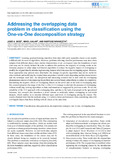Mostrar el registro sencillo del ítem
Addressing the overlapping data problem in classification using the one-vs-one decomposition strategy
| dc.creator | Sáez, José Antonio | es_ES |
| dc.creator | Galar Idoate, Mikel | es_ES |
| dc.creator | Krawczyk, Bartosz | es_ES |
| dc.date.accessioned | 2020-02-18T13:10:04Z | |
| dc.date.available | 2020-02-18T13:10:04Z | |
| dc.date.issued | 2019 | |
| dc.identifier.issn | 2169-3536 | |
| dc.identifier.uri | https://hdl.handle.net/2454/36275 | |
| dc.description.abstract | Learning good-performing classifiers from data with easily separable classes is not usually a difficult task for most of the algorithms. However, problems affecting classifier performance may arise when samples from different classes share similar characteristics or are overlapped, since the boundaries of each class may not be clearly defined. In order to address this problem, the majority of existing works in the literature propose to either adapt well-known algorithms to reduce the negative impact of overlapping or modify the original data by introducing/removing features which decrease the overlapping region. However, these approaches may present some drawbacks: the changes in specific algorithms may not be useful for other methods and modifying the original data can produce variable results depending on data characteristics and the technique used later. An unexplored and interesting research line to deal with the overlapping phenomenon consists of decomposing the problem into several binary subproblems to reduce its complexity, diminishing the negative effects of overlapping. Based on this novel idea in the field of overlapping data, this paper proposes the usage of the One-vs-One (OVO) strategy to alleviate the presence of overlapping, without modifying existing algorithms or data conformations as suggested by previous works. To test the suitability of the OVO approach with overlapping data, and due to the lack of proposals in the specialized literature, this research also introduces a novel scheme to artificially induce overlapping in real-world datasets, which enables us to simulate different types and levels of overlapping among the classes. The results obtained show that the methods using the OVO achieve better performances when considering data with overlapped classes than those dealing with all classes at the same time. | en |
| dc.description.sponsorship | The work of J. A. Sáez was supported by the Juan de la Cierva-formación Fellowship from the Spanish Ministry of Economy, Industry and Competitiveness under Grant FJCI-2015-25547. The work of M. Galar was supported in part by the Spanish Ministry of Economy, Industry and Competitiveness (MINECO), in part by the AEI/FEDER, and in part by the UE under Project TIN2016-77356-P. The work of B. Krawczyk was supported by the Polish National Science Center under Grant UMO-2015/19/B/ST6/01597. | en |
| dc.format.extent | 15 p. | |
| dc.format.mimetype | application/pdf | en |
| dc.language.iso | eng | en |
| dc.publisher | IEEE | en |
| dc.relation.ispartof | IEEE Access, 2019, 7, 83396-83411 | en |
| dc.rights | This work is licensed under a Creative Commons Attribution 3.0 License | en |
| dc.rights.uri | https://creativecommons.org/licenses/by/3.0/ | |
| dc.subject | Classification | en |
| dc.subject | Data generation | en |
| dc.subject | Decomposition strategies | en |
| dc.subject | One-vs-one | en |
| dc.subject | Overlapping data | en |
| dc.title | Addressing the overlapping data problem in classification using the one-vs-one decomposition strategy | en |
| dc.type | info:eu-repo/semantics/article | en |
| dc.type | Artículo / Artikulua | es |
| dc.contributor.department | Institute of Smart Cities - ISC | es_ES |
| dc.rights.accessRights | info:eu-repo/semantics/openAccess | en |
| dc.rights.accessRights | Acceso abierto / Sarbide irekia | es |
| dc.identifier.doi | 10.1109/ACCESS.2019.2925300 | |
| dc.relation.projectID | info:eu-repo/grantAgreement/ES/1PE/TIN2016-77356-P | en |
| dc.relation.publisherversion | https://doi.org/10.1109/ACCESS.2019.2925300 | |
| dc.type.version | Versión publicada / Argitaratu den bertsioa | es |
| dc.type.version | info:eu-repo/semantics/publishedVersion | en |



